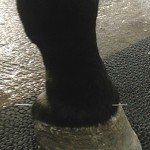Seeking solutions to help horses heal and feel better outside of traditional and conventional veterinary medicine is becoming increasingly commonplace. Horse owners are not necessarily rejecting conventional medicine, rather they simply feel that alternative modalities offer complementary approaches. For example in addition to using anti-inflammatory drugs to ease muscle pain, they may also use chiropractic,




